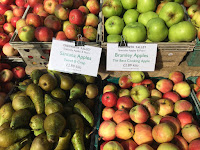The Centre for Ageing Better has added new images to its age-friendly free-to-use image database. These new photos are images of older women at work. You will see they are in a variety of work situations and have various body types etc. The Centre publicised this by encouraging older women to tweet a photo of themselves at work with the hashtag #awomanswork [I think drawing on the motto "A woman's work is never done"] so I have illustrated this post with the picture I tweeted (taken by me) rather than one of theirs.
I do use their image database already, and I encourage others to do this as well. When you search on "older person" on general-purpose free image databases, you tend to come up with either the awful wrinkly-hand images or impossibly aspirational pictures. Part of media and information literacy is being aware of the impact these images have on the people concerned.
The database is at https://ageing-better.org.uk/news/image-library-contributions-invisible-older-women-work




















